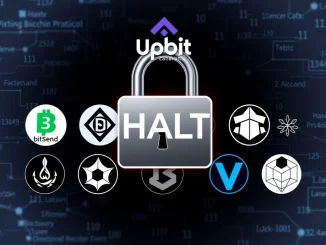
Exciting news for the crypto world coming straight out of South Korea! Upbit, one of the nation’s leading cryptocurrency exchanges, has just made a groundbreaking announcement. They’re now enabling government agencies to establish accounts for virtual asset transactions. Yes, you heard that right! Imagine the Prosecution Service, the National Tax Service, and even local governments diving into the crypto space with dedicated accounts on a major exchange. This isn’t just a small step; it’s a significant leap towards mainstream crypto adoption and regulatory clarity in South Korea. Let’s delve into what this strategic move means for the crypto landscape.
Why Are Upbit Government Accounts a Game Changer for South Korea Crypto Regulation?
This announcement from Upbit isn’t just about adding more users to their platform; it signals a monumental shift in how South Korea is approaching crypto regulation. For government bodies like the Prosecution Service and the National Tax Service to officially engage with crypto exchanges, it underscores a growing acceptance and formalization of virtual assets within the governmental framework. Let’s break down why this is such a pivotal moment:
- Enhanced Transparency and Accountability: By allowing government agencies to operate within regulated crypto exchange environments like Upbit, it brings a new level of transparency to government-related crypto transactions. This can be crucial for tracking illicit activities and ensuring accountability in the handling of digital assets.
- Legitimizing Crypto as an Asset Class: When government institutions start using crypto platforms for transactions, it sends a powerful message: cryptocurrencies are not just speculative digital tokens, but legitimate assets that can be used and managed within established legal and financial systems. This can boost investor confidence and attract more institutional interest in the crypto market.
- Streamlining Law Enforcement and Tax Collection: For agencies like the Prosecution Service and the National Tax Service, having accounts on Upbit can significantly streamline processes related to crypto-related investigations, asset recovery, and tax collection. It provides a direct and regulated channel for managing virtual assets involved in legal and financial proceedings.
- Setting a Precedent for Global Crypto Adoption: South Korea is often seen as a bellwether for technological trends, especially in the crypto space. Upbit’s initiative could set a precedent for other countries to follow, encouraging governments worldwide to explore and integrate cryptocurrencies into their operational frameworks.
Navigating Crypto Compliance: What Does This Mean for Agencies?
While the move to open Upbit government accounts is exciting, it also brings the crucial aspect of crypto compliance to the forefront. Government agencies, known for their stringent regulatory adherence, will need to navigate the complexities of crypto transactions within a compliant framework. Here are some key considerations:
| Compliance Aspect | Implications for Government Agencies |
|---|---|
| KYC/AML Regulations | Government agencies will still need to adhere to Know Your Customer (KYC) and Anti-Money Laundering (AML) regulations when operating on Upbit. This ensures that even government-related crypto activities are tracked and monitored for illicit activities. |
| Data Privacy and Security | Handling sensitive government data within crypto transactions requires robust data privacy and security measures. Agencies will need to ensure that their crypto operations are secure and compliant with data protection laws. |
| Transaction Monitoring and Reporting | Government agencies will likely be subject to transaction monitoring and reporting requirements similar to other institutional users on crypto exchanges. This is essential for maintaining transparency and preventing misuse of crypto assets. |
| Audit and Accountability | Public scrutiny and accountability are paramount for government operations. Crypto transactions conducted by agencies will need to be auditable and transparent to maintain public trust and ensure proper use of funds. |
Upbit, as a regulated exchange, will play a vital role in providing the necessary infrastructure and compliance tools to support these government entities in their crypto endeavors. This partnership between a leading crypto exchange and government agencies highlights the maturation of the crypto industry in South Korea.
The Broader Impact: Institutional Crypto Adoption in South Korea
Upbit enabling government agencies to open accounts is a significant stride towards broader institutional crypto adoption in South Korea. This move can have ripple effects across various sectors:
- Increased Institutional Investment: Seeing government agencies engage with crypto can encourage other institutions, such as pension funds, corporations, and traditional financial institutions, to explore and invest in virtual assets.
- Market Maturation and Stability: Greater institutional involvement often leads to increased market liquidity and stability. As more established entities enter the crypto space, it can reduce volatility and create a more mature market environment.
- Innovation and Development: Government interest in crypto can spur further innovation and development within the blockchain and cryptocurrency sectors. It can lead to the creation of new use cases and applications for virtual assets, potentially driving economic growth and technological advancement.
- Regulatory Clarity and Confidence: This initiative signals a proactive approach from South Korean regulators in embracing and integrating crypto into the financial system. Such clarity and support from regulatory bodies can foster a more conducive environment for crypto businesses and investors.
Virtual Asset Transactions: What Kind of Activities Will Government Agencies Engage In?
Now, you might be wondering, what exactly will government agencies be doing with these virtual asset transactions on Upbit? While the specifics will likely vary depending on the agency and their mandate, here are some potential scenarios:
- Asset Seizure and Management: Law enforcement agencies like the Prosecution Service might use these accounts to manage and liquidate seized crypto assets from criminal activities. This allows for a more efficient and regulated process for handling digital assets obtained through illegal means.
- Tax Collection and Refunds: The National Tax Service could potentially use crypto accounts for collecting taxes in cryptocurrencies or issuing tax refunds in virtual assets in the future. This could streamline tax processes for crypto-related income and holdings.
- Government Grants and Funding: Local governments or other agencies might explore using crypto for disbursing grants or funding for blockchain-related projects or initiatives. This could enhance transparency and efficiency in government fund distribution.
- Research and Development: Government research institutions might utilize crypto platforms to study blockchain technology, experiment with decentralized applications, or conduct research related to digital currencies and virtual assets.
The possibilities are vast, and as government agencies become more familiar with the capabilities of crypto and blockchain technology, we can expect to see even more innovative use cases emerge.
Looking Ahead: The Future of Government Crypto Engagement
Upbit’s decision to support government agency accounts marks a pivotal moment in the evolution of crypto in South Korea and globally. It signifies a growing recognition of cryptocurrencies as a legitimate and integral part of the financial and technological landscape. As governments worldwide grapple with regulating and understanding virtual assets, South Korea is taking a proactive and strategic approach by integrating them into governmental operations.
This move is not without its challenges, including ensuring robust security, maintaining compliance, and navigating the evolving regulatory environment. However, the potential benefits – increased transparency, enhanced efficiency, and greater institutional adoption – are undeniable. As we move forward, it will be fascinating to watch how this initiative unfolds and the impact it has on the broader crypto ecosystem. One thing is clear: the walls between traditional government operations and the innovative world of cryptocurrency are becoming increasingly permeable, paving the way for a future where digital assets play a more integrated role in our societies.



